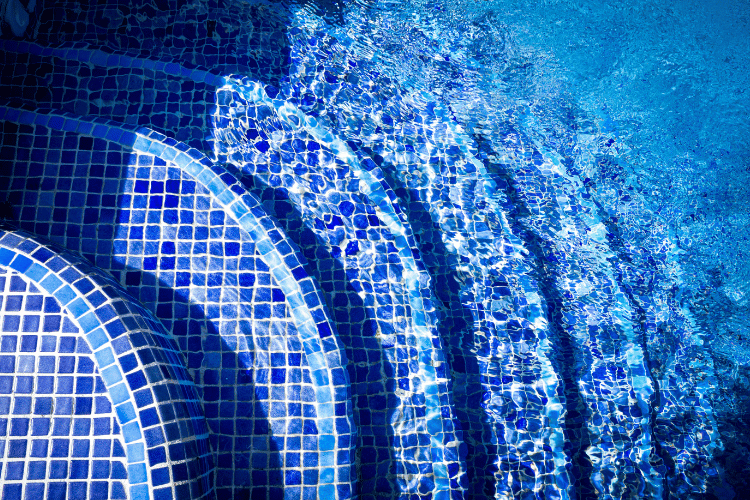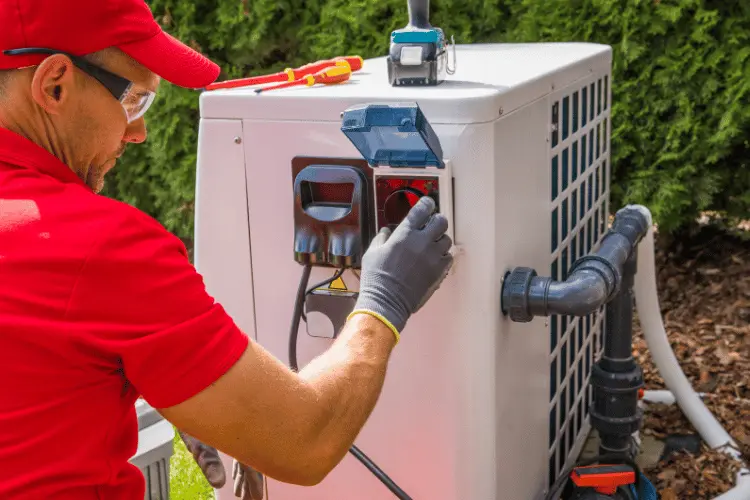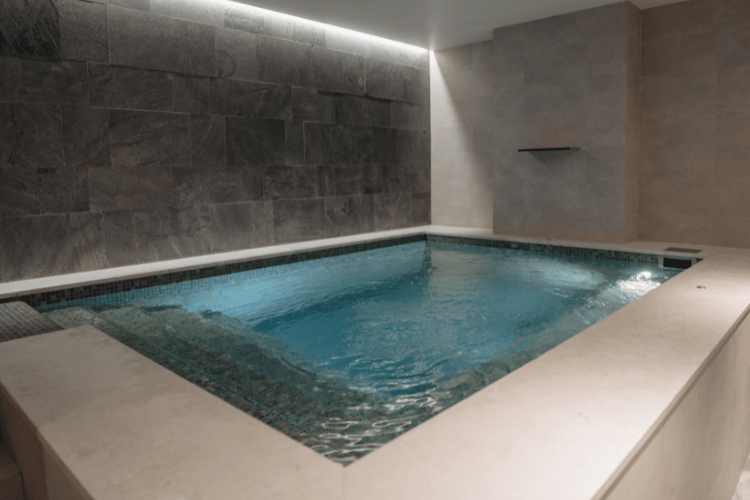
- By greenair-cy
- In Heating
Choosing the Best Swimming Pool Heater for Year-Round Enjoyment
Stepping into the cool embrace of a swimming pool is a delightful escape from the everyday. Yet, as seasons change, so does the water’s welcoming touch. A swimming pool heater ensures that your aquatic haven is consistently inviting, no matter the time of year. It stands as a guardian against the unpredictability of weather, making every dip a warm solace.
Choosing the right swimming pool heater involves more than just picking a product; it’s about crafting experiences. A heated pool extends beyond summer fun, offering therapeutic warmth and a year-long oasis. It’s a decision that weighs on factors like efficiency, cost, and the specific nuances of your personal retreat.
At Green Air, we understand the complexity of this choice. That’s why this article aims to guide you through the nuances of selecting a swimming pool heater. We’ll dive into the essentials, from assessing your needs to understanding the different heaters available, all while keeping an eye on cost, installation, and maintenance.
Understanding Swimming Pool Heaters
What is a Swimming Pool Heater?
Imagine a swimming pool heater as the heart of your pool’s ecosystem. It pumps life into the waters, allowing you to control the climate of your aquatic escape. The right heater can transform your pool from a seasonal feature to a year-round delight. Let’s explore how these devices promise a consistent temperature for your comfort.
Types of Swimming Pool Heaters
Three main contenders rule the market: solar, gas, and electric heaters. Each carries its own set of virtues and considerations. Solar heaters commend themselves for their eco-friendliness, gas heaters are celebrated for their rapid heating capabilities, and electric heaters are appreciated for their consistent output. Deciding which type suits your pool best is the cornerstone of a satisfactory choice.
Functions and Benefits
Heaters do more than warm waters; they extend the life of your pool parties and serene night swims. They offer a shield against the chilly whispers of fall and the brisk air of spring. With a swimming pool heater, your outdoor oasis becomes a year-round feature, not just a summertime luxury.
Evaluating Your Pool Heating Needs
Evaluating your pool heating needs begins with understanding the frequency and seasonality of your pool usage. If you’re a year-round swimmer, your heating needs will differ from someone who uses their pool primarily in the summer months. For those in cooler climates looking to extend their swimming season, a robust heating solution will be essential to maintain a comfortable water temperature. Understanding the dimensions of your pool, its geographic location, and your personal use patterns is pivotal. These factors dictate the power and type of heater you’ll need. A small heater may suffice for intimate spaces, while larger pools might demand a more robust system.
The size and volume of your pool are also critical factors in determining your heating requirements. Larger pools require more powerful heaters to achieve and maintain the desired temperature. It’s not just about choosing the most powerful option; it’s about finding the right balance between heater capacity and pool size to ensure energy-efficient operation.
Additionally, environmental factors play a significant role. Pools exposed to wind, without a solar cover, or in shaded areas lose heat more quickly and therefore may require a more potent heating system. Conversely, a well-insulated pool with ample direct sunlight may benefit from a less intensive heating solution, leveraging natural warmth to aid in maintaining temperature. Your local climate is a silent player in this decision. Pools in cooler regions will require a heater with more muscle, whereas milder climates offer more leniency. Aligning your heater’s capabilities with the temperament of your environment is a smart strategy for optimal comfort.
Lastly, your personal comfort preferences will dictate the ideal temperature of your pool. Some swimmers prefer cooler temperatures, while others may desire a warmer, more spa-like experience. Selecting a heater that can accurately and efficiently meet your specific temperature preference is key to ensuring satisfaction with your pool heating system. With Green Air’s varied range of heating options, you can pinpoint a solution that aligns with your unique needs and preferences.
Types of Swimming Pool Heaters Compared
Efficiency, Cost, and Suitability
Each heater type shines in different scenarios. Solar heaters excel in efficiency but require a generous upfront investment. Gas heaters boast quick heating but can be costlier to operate. Electric heaters offer a middle ground, with moderate costs and consistent performance.
- Solar Pool Heaters
- Solar pool heaters use solar panels to capture energy from the sun, which is then used to heat the pool water. They are the most eco-friendly option and can be cost-effective over time due to minimal operational costs. However, their efficiency depends heavily on sunlight availability and they require a significant initial investment for the solar panels and installation.
- Gas Pool Heaters
- Gas heaters use natural gas or propane to heat the pool and are known for their rapid heating ability. They are ideal for pools that aren’t used regularly, as they can quickly heat the water regardless of the weather. The downside is the ongoing fuel cost which can be high, especially in colder climates or for large pools, and they have a larger carbon footprint compared to solar options.
- Electric Heat Pumps
- Electric heat pumps draw warmth from the air, transferring it to the pool water. These heaters are more energy-efficient than gas heaters and work well in a variety of climates, as long as the temperature remains above freezing. While their operational costs are lower than gas heaters, they typically have higher upfront costs and heat the pool water more slowly.
- Electric Resistance Heaters
- Electric resistance heaters generate heat by passing electricity through resistors. They are compact and can be less expensive to install but are best for small pools or spas due to their high operational costs. They are less energy-efficient than heat pumps and solar heaters, making them suitable for occasional use or when other heating options are not viable.
- Hybrid Pool Heaters
- Hybrid systems combine features from different types of heaters, such as a heat pump and solar heater, to optimize efficiency and performance. They offer the benefit of reliable heating in various weather conditions and can reduce operational costs by leveraging the most effective heating method available at any given time. The complexity of hybrid systems often results in higher initial costs for installation and potential maintenance.
| Type of Pool Heater | Pro | Con |
| Solar Pool Heaters | Eco-friendly; uses renewable energy and minimal operating cost | Reliant on sunny weather; may require backup system |
| Gas Pool Heaters | Heats pool quickly, regardless of weather or time | High operational costs; not environmentally friendly |
| Electric Heat Pumps | Energy efficient; lower running costs than electric resistance heaters | Higher initial cost; performance drops in cooler temperatures |
| Electric Resistance Heaters | Easy installation; ideal for small pools or spas | High operational costs; inefficient energy use |
| Hybrid Pool Heaters | Versatile heating options, can switch between energy sources | Complex installation; can be expensive to purchase and operate |
Cost Considerations and Energy Efficiency
- Initial and Operational Costs
An informed buyer considers both the sticker price and the whispering costs of electricity or gas bills. While solar heaters may intimidate with their initial cost, their frugality over time is unmatched. Electric and gas heaters’ recurring expenses should be weighed against their convenience and speed.
- Lifespan and Maintenance Costs
Anticipating the long-term relationship with your swimming pool heater is as crucial as the first date. The longevity of solar heaters can span decades, while gas and electric options may require more frequent flirts with repair services.
When deliberating on a swimming pool heater, cost considerations are pivotal. Initial investment, operational costs, and potential savings must all be weighed. Solar heaters generally command a higher upfront cost compared to traditional gas or electric heaters. However, they offer substantial long-term savings by harnessing free solar energy, translating to negligible operational costs.
Energy efficiency is another critical factor. It defines the amount of input energy converted into actual heating for your pool. Gas heaters, while less energy-efficient, heat pools quickly, making them suitable for pools that aren’t used regularly. Electric heat pumps boast higher energy efficiency by transferring heat from the air to the pool, although their performance can dip in colder climates.
Solar pool heaters stand out for their efficiency and eco-friendliness, often operating at the cost of the existing pool pump’s energy use. They may take longer to heat the pool but do so without generating extra energy costs or emissions. The efficiency of solar heaters directly correlates with sunlight availability, hence their popularity in sunnier locales.
Considering the lifespan of different heater types is essential in the cost equation. While gas heaters may have a shorter life expectancy, solar and electric heat pumps typically last longer, potentially offsetting their higher upfront costs with reduced replacement and repair expenses over time. The right choice balances initial cost with long-term value and efficiency.
Green Air’s offerings come into play here, as they not only focus on providing energy-efficient solutions but also emphasize cost-effectiveness. With advanced technology and energy-saving features, their systems aim to minimize the total cost of ownership while maximizing performance. Thus, investing in their high-quality pool heating solutions promises to strike an optimal balance between initial outlay and ongoing energy expenses.
Installation and Maintenance
The Installation Process
The installation process of a swimming pool heater is as critical as the selection itself. A precise and professional installation ensures maximum efficiency and longevity of the system. Typically, the complexity of installation varies with the type of heater; solar heaters may require extensive panel placement and pipework, whereas electric and gas heaters often need a simpler setup. The expertise of qualified technicians, such as those at Green Air, is indispensable in setting up the system to function flawlessly from day one.
Maintenance Practices
Maintenance, on the other hand, is the key to sustaining the heater’s performance and extending its life. Regular upkeep, which includes checking connections, cleaning filters, and inspecting the heating elements, can prevent costly repairs and inefficiencies. Solar panel systems may need less frequent attention but should still be inspected for panel integrity and optimal exposure. Engaging with a company that provides comprehensive after-sales support ensures that your swimming pool heater remains in top condition throughout its usage.

Making the Right Choice for Your Pool
Making the right choice for your pool’s heating solution is pivotal to ensuring year-round enjoyment. It’s about aligning your desires for comfort, practicality, and aesthetics with the realities of climate, space, and budget. When selecting a swimming pool heater, consider not only the immediate gratification of a warm swim but also the long-term implications of your choice on utility bills and maintenance.
Consultation with professionals can illuminate the path to a wise decision. Experts can analyze your specific situation, including pool size, location, and usage patterns, to recommend the most suitable heater type. Whether it’s the consistent warmth of an electric heater, the cost-effectiveness of solar, or the rapid heating of gas, each option should be measured against your personal checklist of needs and expectations.
Energy efficiency and environmental impact play significant roles in the decision-making process. In today’s eco-conscious world, a solar pool heater might appeal to those looking to minimize their carbon footprint, while others might prioritize the quick and powerful heating provided by gas. It’s essential to factor in not only the initial investment but also the ongoing operational costs associated with each type of heater.
Lastly, the choice should reflect a balance between upfront costs and future savings. While solar heaters may present a higher initial expense, the reduction in energy bills can offset this over time. Conversely, gas and electric heaters may have lower upfront costs but could lead to higher operational expenses. By considering both the short-term and long-term financial impacts, pool owners can make an informed decision that ensures optimal comfort and efficiency.
Personalized Advice
Every pool is a fingerprint, unique in its needs and demands. Professional guidance from Green Air’s seasoned consultants can translate the jargon into a language tailored just for your pool.
Green Air’s Expertise
With an array of quality swimming pool heaters and a commitment to excellence in service, Green Air is your ally. We navigate you through the sea of options to the shore of your perfect match.

Conclusion
Choosing a swimming pool heater is a voyage towards extending the joy your pool brings. It’s a journey of comfort, value, and tailored experiences. As we’ve explored, the right heater is a beacon that guarantees the allure of your pool transcends seasons.
Reflect on the harmony between cost, efficiency, and your unique pool’s characteristics. Remember, a well-chosen heater not only warms your waters but also the memories made within them. It’s an investment in countless moments of joy and relaxation.
At Green Air, we stand ready to illuminate your path to the best swimming pool heater. Our expertise is your guide, ensuring that your pool remains a haven of warmth and enjoyment, any day of the year.
